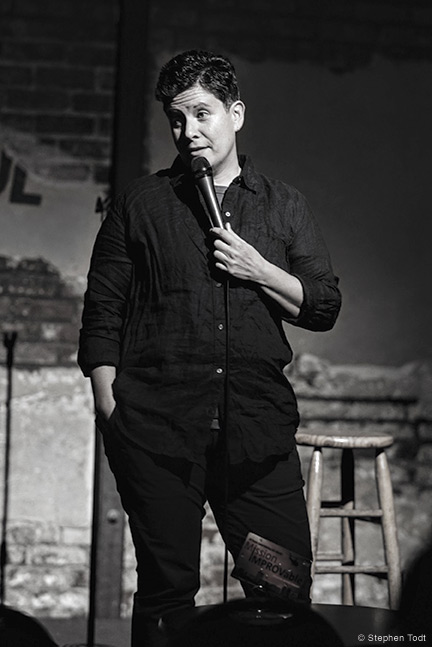
How courage, talent, and hard work turned a tenured law professor into a struggling stand-up comic.
At the age of 34, Liz Glazer C’01 G’01 took a buyout from her position as a tenured law professor and told her parents that she was officially retired. The next night, she stepped onto the stage of a basement comedy club in New York and started talking about orgasms, her mother, and her cat. The audience of millennials, first daters, suburbanites—plus Glazer’s parents—erupted in laughter and her new career was sealed. She was now an Ivy League-educated stand-up comedian.
“I did the traditional path to stand-up comedy: I went to law school, I worked at a firm, and I taught at a law school for nine years,” jokes Glazer, who is now 39. “It’s the reverse of a Jewish parent’s dream,” she adds. And even though her parents were in the audience, “They weren’t thrilled.”
Toby Glazer, Liz’s mother, doesn’t deny it.
“Elizabeth was a tenured professor, and I just assumed that her life was all going on a good path. I don’t know that I was disappointed, but it was just a shock,” she says. “When I tell people what she’s done, everyone says, ‘That’s really great.’ I say, ‘You’re not the mother of the stand-up comic.’”
A philosophy major at Penn before attending law school at the University of Chicago, Glazer followed that path in the first place because she didn’t want to disappoint her parents and was heavily influenced by the idea that one should have a standard, normalized profession. She always loved writing and thinking, and analyzing her thoughts, and these seemed to mesh with a law career.
After two years in practice with a New York firm, Glazer took a faculty position at Hofstra University. She says her favorite part of being a lawyer was teaching and standing in front of her students while they listened. She loves connecting with an audience and finds a lot of similarities between stand-up and teaching law. What she didn’t love was the rigidity of a law professor’s tenure track: everything in her life felt like it was for the accomplishment of that end goal, and it made Glazer feel overly directed. “I wanted to do something without a goal, and improv seemed really fun,” she says.
Glazer took an improv class in Chicago while she was a visiting professor at Loyola University’s law school in 2009, and it was fun, though it didn’t turn her into an instant comedian. But three years later, back in Chicago from New York, again as a visiting law professor, this time at Northwestern, she took a course in stand-up comedy—and was hooked. She loved having the freedom to talk about anything she wanted on stage, to make people laugh, to listen, and to connect.
Nine months later, when Hofstra, facing budget cuts, was offering faculty buyouts, Glazer decided to take the leap, though with considerable trepidation. By this point, she had begun writing and performing comedy by night while teaching by day. But she was only making about $40 per show, if that. And beyond the steady paycheck, should she give up her career and identity as a lawyer? “People talk about security like it’s money,” she says, “but it’s also a professional identity. Now, I don’t have a school or a letterhead to say that I’m important. I’m just me—but I was me the whole time.”
Under the terms of the buyout, Glazer had a year and a half to prepare herself to transition from law professor to comedian. She upped the number of shows she was performing and writing—and started saving money, so she could survive for a while even if she was still working for $40 per night.
She prepared just like she would for any legal case or academic event: she took classes, she recorded her jokes, and she analyzed why they would make people laugh sometimes and at others fall short. (Pro tip: she found that switching around the wording could bring out more belly laughs.)
Her buyout-bought time flew by, and then one day—nine years after it started—Glazer’s law career was over and her official comedy career began.
That was about five years ago. Glazer still retains some of her lawyerly traits: she doesn’t like to stay up late, preferring to be home with her cat and her girlfriend by 9:15 p.m., which doesn’t always mesh with the prevailing stand-up comedy culture. She’s also a meticulous note-taker, very detail-oriented. She studies the personalities of her audiences so she can find connections, catering her sets to them. And she makes herself sit at her computer and write daily, even occasionally writing live, with Facebook holding her accountable.
All this persistence has paid off.
In November, Glazer was booked to do stand-up 15 times out of the month in Los Angeles, where she now lives, and she frequently flies around the country for gigs. She’s also working on a television pilot and meets frequently with people who are signed onto the project. Though she still occasionally wonders about her future (“I try to believe in myself but also have extreme self-doubt,” she says), she’s happy, she has a job she loves—and at the end of the day, she’s usually home by 9:15 p.m. And that’s good enough.
—Danielle Braff

